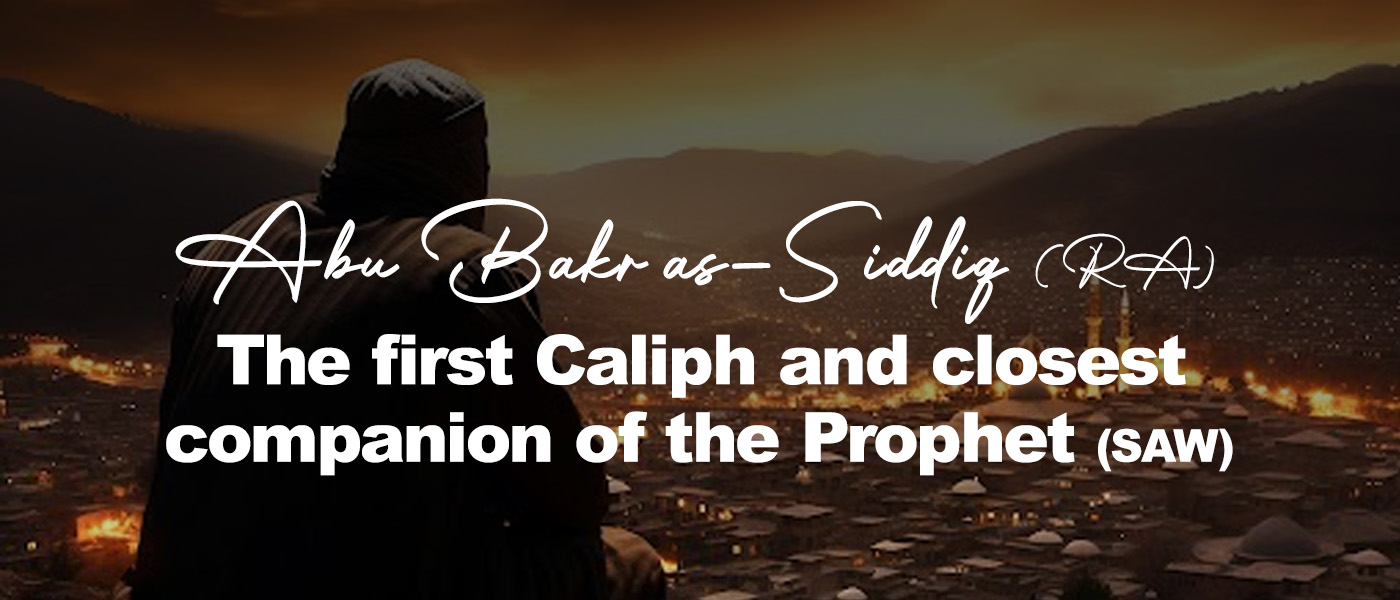
In the long and shining history of Islam, few names stand as tall and as noble as Abu Bakr as-Siddiq (RA). As the first adult male to embrace Islam, the closest companion of the Prophet Muhammad (SAW), and the first rightly-guided Caliph – Khalifah Rashidah – of the Muslim Ummah, his life exemplifies unwavering faith, moral integrity, and visionary leadership.
Early life and conversion
Born in 573 CE in Makkah, Abu Bakr as-Siddiq’s (RA) given name was Abdullah ibn Abi Quhafa. He belonged to the Banu Taym clan of the Quraysh tribe and was known for his honesty, generosity, and refined character even before the advent of Islam. Unlike many of his contemporaries, he never worshipped idols or consumed alcohol, and he was widely trusted in his community.
Abu Bakr as-Siddiq (RA) was the first adult male outside the Prophet’s (SAW) household to accept Islam. His conversion had a profound ripple effect, leading to the embrace of Islam by several prominent figures, including Uthman ibn Affan (RA), Talhah ibn Ubaydullah (RA), Abdur-Rahman ibn Awf (RA), Sa’d ibn Abi Waqqas (RA), and Zubayr ibn al-Awwam (RA). His early support of the Prophet (SAW) was not merely ideological — it was material and emotional. Abu Bakr as-Siddiq not only believed in Islam, but he invested himself in its mission with all his wealth, influence, and energy. He even used his wealth to free slaves, most notably Bilal ibn Rabah (RA).
His support of the Prophet (SAW)
Even through the most difficult phases of the Prophet’s (SAW) mission, Abu Bakr as-Siddiq (RA) stood firmly by his side.
The Prophet (SAW) conferred upon him the title as-Siddiq (“the Truthful”) after Abu Bakr as-Siddiq (RA) unhesitatingly had faith in the miraculous account of Isra’ and Me’raaj. His unwavering belief in the Prophet’s (SAW) truthfulness became a hallmark of his faith. The Quranic verse,

One of the most intimate examples of his loyalty is during the Hijrah to Madinah. As Allah (SWT) revealed the command to migrate, the Prophet (SAW) chose Abu Bakr as-Siddiq (RA) as his sole companion on the perilous journey. In the cave of Thawr, when the Quraysh came dangerously close, Abu Bakr as-Siddiq (RA) whispered, “If one of them were to look down at his feet, he would see us!” The Prophet (SAW) then replied calmly, “O Abu Bakr, what do you think of two people when Allah is their third?” (Sahih Bukhari)
This event is even mentioned in The Quran when Allah (SWT) said, “It does not matter if you believers do not support him, for Allah did in fact support him when the disbelievers drove him out of Mecca and he was only one of two.

His leadership as a Caliph and preservation of the Ummah
Following the death of the Prophet (SAW), the Muslim community was devastated, caught between profound grief and uncertainty. Abu Bakr as-Siddiq (RA) rose to the occasion with clarity and conviction. He addressed the companions, saying, “Whoever worshipped Muhammad, know that Muhammad has died. But whoever worships Allah, know that Allah is Ever-Living and does not die.” Then he said, “Muḥammad is no more than a messenger; other messengers have gone before him. If he were to die or to be killed, would you regress into disbelief? Those who do so will not harm Allah whatsoever. And Allah will reward those who are grateful.” (The Clear Quran®, 3:144) These words helped stabilize the community and reaffirm their commitment to divine guidance.
The question of succession was resolved at Saqifah Banu Sa’idah, where Abu Bakr as-Siddiq (RA) was chosen as Caliph through consultation (shura) among the Muhajirun and Ansar. His first address as Caliph was marked by humility: “I have been appointed over you, but I am not the best among you. If I do well, help me; if I do wrong, correct me.” This statement set the tone for his leadership — one rooted in accountability, service, and spiritual consciousness.
During his brief caliphate of approximately two years, Abu Bakr as-Siddiq (RA) faced significant challenges.

These wars were not merely political — they were theological affirmations of Islam’s unity and continuity after the Prophet’s (SAW) death.
Another monumental achievement of his caliphate was the compilation of The Quran. After the Battle of Yamama, in which many Quran memorizers were martyred, Abu Bakr as-Siddiq (RA) feared the loss of the sacred text. He commissioned Zayd ibn Thabit (RA) to collect The Quran into a single manuscript, ensuring its preservation for future generations. This act laid the foundation for later standardization of The Quran under Caliph Uthman ibn Affan (RA).
Abu Bakr as-Siddiq (RA) also initiated military expeditions that would later lead to the expansion of Islam into Syria and Iraq. Though he did not live to see these conquests, his strategic foresight and trust in commanders like Khalid ibn al-Walid (RA) were instrumental in Islam’s early geopolitical growth.
To recap, Abu Bakr as-Siddiq (RA) achieved a great deal in his brief caliphate and left an enduring mark on Islam even today. He:
- Defended the unity of Islam in the Ridda Wars (against apostasy).
- Compiled The Quran into a single manuscript, fearing it might be lost after many memorizers were martyred.
- Sent out the armies that would eventually bring Islam to the lands of Syria and Iraq.
His character and legacy
Despite his position as the most powerful man in the Muslim world, Abu Bakr as-Siddiq (RA) remained humble and accessible. He continued to perform simple tasks, such as milking goats for his neighbors, even after becoming Caliph. When advised to delegate such duties, he replied, “I will continue, for I hope that what I began for the sake of Allah will not be changed by the worldly role I now have.”
His humility extended to his final moments. On his deathbed, he requested that his shroud be made from his own clothes, saying, “The living have more need of new clothes than the dead.” He also asked to be buried beside the Prophet (SAW), a wish that was fulfilled. He passed away in 634 CE and was laid to rest in the chamber of Lady Aisha bint Abu Bakr (RA), his daughter and one of the Prophet’s (SAW) most remarkable wives.
His nomination of Umar ibn al-Khattab (RA) as his successor reflects his concern for the Ummah’s future and his trust in capable leadership. His daughter, Lady Aisha bint Abu Bakr (RA) became one of the most influential scholars in Islamic history, further extending his spiritual and intellectual legacy.
Abu Bakr as-Siddiq’s (RA) legacy is preserved not only in historical records but in the hearts of believers. His life offers enduring lessons in sincerity, courage, humility, and leadership.
What we can learn from Abu Bakr as-Siddiq (RA) today
Abu Bakr as-Siddiq (RA) is a shining example of sincerity, loyalty, and quiet strength. He supported the Prophet (SAW) when few did, and he led the Ummah with courage when it was most needed. His life teaches us:
- To have unwavering faith in Allah and His Messenger (SAW).
- To act with humility, even in positions of power.
- To use our influence and wealth in the service of truth.
Let us remember him not only as a historical figure, but as a guide and model for our own lives.
Dua
O Allah (SWT), grant us the clarity and conviction that Abu Bakr as-Siddiq (RA) showed when he reminded the believers that You are Ever-Living. In moments of grief and confusion, let Your words be our anchor and Your guidance our light.
O Allah (SWT), just as You chose Abu Bakr as-Siddiq (RA) to stand beside Your Messenger (SAW) in the cave, choose us to stand firm in Your path when fear surrounds us. Let our trust in You be unwavering, and our reliance upon You complete.
O Allah (SWT), make us guardians of Your truth, protectors of Your Book, and servants of Your Ummah; make our hearts generous and our hands open in service to You; let our deeds remain pure, even when our roles grow heavy.
O Allah (SWT), just as Abu Bakr as-Siddiq (RA) was the first to believe and the first to lead after Your Messenger (SAW), make us among the first to respond to Your call and the first to uphold Your commands.
O Allah (SWT), allow us to live with truth, die upon truth, and be resurrected among the truthful.
Allahumma Ameen!


